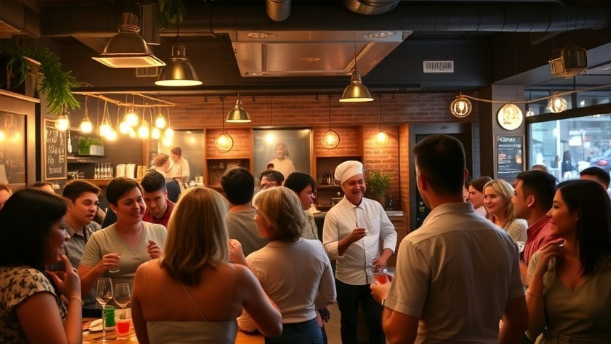Introducing Geshmak’s Shared Events Concept to Texas

We are living in the apex of what economists have referred to as the “Sharing Economy.”
This is the premise that led to the creation of the Restaurant Space Sharing (RSS) concept that is Geshmak.
What is the “Sharing Economy?” What does it mean? It refers to an economic model where individuals share access to goods, services, or resources; where instead of owning items or services outright, people borrow, rent, or trade them. The concept has been around for a very long time, but only recently over the last 10-20 years (fueled by the digital age) has the Sharing Economy become such an ever-present part of everyday life.
Today, Sharing Platforms include ‘ride sharing’ or ‘shared transportation’ such as Uber or Lyft. With companies like Airbnb and later Vrbo, the world was introduced to the now standard practice of ‘shared lodging’ or ‘shared accommodations.’ WeWork brought about the idea of ‘shared office space,’ while ‘shared services’ include platforms such as TaskRabbit, or Fiverr. Companies like DoorDash, Instacart, Uber and many others utilize the ‘shared labor’ model where instead of hiring full-time employees these companies pull from the unused hours of the labor pool. Going back a little further, one could even say that a timeshare is a ‘shared mortgage’ or ‘shared home ownership.’ The list goes on and on.
What do all these concepts have in common? A couple of things…first and foremost is they create WIN-WIN scenarios for all parties involved. Nobody is giving anything up; everybody benefits. The other main commonality, however, is that all of these platforms allow for the capitalization or monetization of underutilized resources, or what can be referred to as ‘Dormant Assets.’
Second home? Dormant asset. Unleased office space? Dormant asset. Idle time? Dormant asset. The question that the Founder sought to answer when creating Geshmak was, what’s next? What is the most valuable asset or commodity in the economy that still goes underutilized, that sits dormant? The answer is obvious.
No industry was hit harder by Covid than the restaurant industry. It still has yet to fully recover, with hours of operation down an average of 6-8 hrs/wk. No industry has a higher barrier to entry, making it one of the hardest businesses to start. No industry has tighter margins and faces more of a constant uphill battle just to stay in business. No industry has a higher rate of failure. And no industry is more in need of a commonsense solution that helps everyone involved (a WIN-WIN) in perhaps the toughest business there is. And no industry is ready to join and benefit from the ‘Sharing Economy’ in this unique era of problem solving.
Introducing the Restaurant Space Sharing model – a seamless, Airbnb-style platform where restaurant owners can maximize their space’s potential, while chefs, pop-up creators, food innovators, culinary creatives, and aspiring restaurateurs can access fully-equipped venues without the costs or overhead of a permanent location. This system turns downtime into opportunity, making the most of every restaurant space day or night, meal by meal, and bringing culinary diversity to the community.
One thing people often ask is what’s with the name. Geshmak (technically pronounced “geesh-MAHK”) is an old Yiddish word that has two meanings. The primary meaning is “extremely tasty.” Its other definition, however, is “extremely fun.”
This company was created to make the world more tasty, and to always have fun while doing it. To partner with Geshmak to make your culinary dreams a reality, or just to learn more, you can view the website along with the featured demo videos at the top of the home page, or you can also direct all inquiries to opportunity@geshmak.com.
 Add Row
Add Row  Add
Add 



Write A Comment